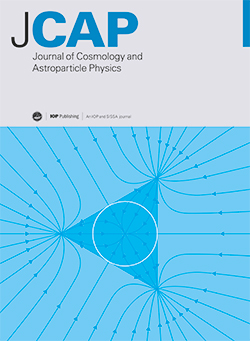Coport:协变框架下的偏振辐射传递新公共代码
IF 5.9
2区 物理与天体物理
Q1 ASTRONOMY & ASTROPHYSICS
Journal of Cosmology and Astroparticle Physics
Pub Date : 2024-11-27
DOI:10.1088/1475-7516/2024/11/054
引用次数: 0
摘要
广义相对论辐射传递计算对于比较黑洞吸积流和喷流的理论模型与观测数据至关重要。在这项工作中,我们介绍了 Coport,[Coport 的公开版本可从以下网址获得:https://github.com/JieweiHuang/Coport.]这是一个新颖的公开代码,专门用于在任何时空中进行协变偏振射线追踪辐射传递计算。Coport 是用 Julia 编写的,它包含一个界面,用于可视化从 HARM 获得的数值结果,HARM 是通用相对论磁流体动力学代码的公开实现。我们通过将其输出结果与各种既定方法的结果进行比较,验证了我们代码的精确性。这包括与分析解决方案进行验证、通过薄盘评估进行验证以及通过厚盘分析进行评估。值得注意的是,我们的代码采用的方法无需分离时空传播和等离子体传播的计算。相反,它直接求解弯曲时空中的耦合、协变、偏振辐射传递方程,将引力效应与等离子体影响无缝整合在一起。这种方法使我们的代码有别于现有的替代方案,并提高了其准确性和效率。本文章由计算机程序翻译,如有差异,请以英文原文为准。
Coport: a new public code for polarized radiative transfer in a covariant framework
General relativistic radiative transfer calculations are essential for comparing theoretical models of black hole accretion flows and jets with observational data. In this work, we introduce Coport,[The public version of Coport is available at the following URL: https://github.com/JieweiHuang/Coport.] a novel public code specifically designed for covariant polarized ray-tracing radiative transfer computations in any spacetime. Written in Julia, Coport includes an interface for visualizing numerical results obtained from HARM, a publicly available implementation of the general relativistic magnetohydrodynamics code. We validate the precision of our code by comparing its outputs with the results from a variety of established methodologies. This includes the verification against analytical solutions, the validation through thin-disk assessments, and the evaluation via thick-disk analyses. Notably, our code employs a methodology that eliminates the need for separating the computations of spacetime propagation and plasma propagation. Instead, it directly solves the coupled, covariant, polarized radiative transfer equation in curved spacetime, seamlessly integrating the effects of gravity with plasma influences. This approach sets our code apart from the existing alternatives and enhances its accuracy and efficiency.
求助全文
通过发布文献求助,成功后即可免费获取论文全文。
去求助
来源期刊

Journal of Cosmology and Astroparticle Physics
地学天文-天文与天体物理
CiteScore
10.20
自引率
23.40%
发文量
632
审稿时长
1 months
期刊介绍:
Journal of Cosmology and Astroparticle Physics (JCAP) encompasses theoretical, observational and experimental areas as well as computation and simulation. The journal covers the latest developments in the theory of all fundamental interactions and their cosmological implications (e.g. M-theory and cosmology, brane cosmology). JCAP''s coverage also includes topics such as formation, dynamics and clustering of galaxies, pre-galactic star formation, x-ray astronomy, radio astronomy, gravitational lensing, active galactic nuclei, intergalactic and interstellar matter.
 求助内容:
求助内容: 应助结果提醒方式:
应助结果提醒方式:


